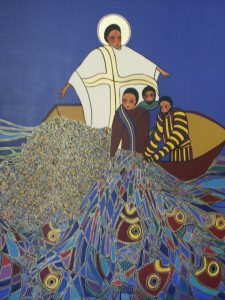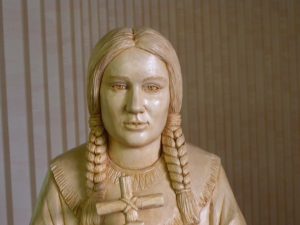HOMILY – FRIDAY of EASTER WEEK
Grace Like a Spider’s Thread:
Optional Memorial – St. Kateri Tekakwitha
(Acts 4:1-12; Ps 118; Jn 21:1-14)
**************************************
Pope Francis states that to be a missionary disciple is to first have a personal encounter with Jesus, and then to share that encounter with others.

Giselle Bauch
The Gospel today recounts the third appearance of the Risen Lord to his disciples – truly a personal encounter. In writing this account, John shows himself to be a theologian of memory and symbolism. The miraculous catch of fish recalls an earlier miraculous catch when Peter first met the Lord. Peter with six other disciples in a boat symbolize the Church, and the number of seven—evocative of completion or fulfillment—is meant to make us consider the eschatological Church, the community of Jesus approaching the end of its journey.
The extraordinary catch symbolizes the work of the Church until the end of the age: to gather in people and to bring them to Christ. St. Augustine argued there were 153 species of fish in the sea, and therefore, this extraordinary number is meant to signal the universality of the Church’s salvific mission.
The charcoal fire recalls the three times Peter denied the Lord beside a charcoal fire. The bread Jesus took and broke recalls the Last Supper, and perhaps the miracle of the loaves. All these details underline the personal encounter the apostles had of the historical Jesus and now the risen Christ. They are an invitation for us to recall our own personal experiences of the Risen Lord in our lives.
In the first reading from Acts, we see Peter as a missionary disciple, sharing his personal experience of Jesus as risen Lord and Messiah with his Jewish people. Filled with the Spirit, he proclaims the first kerygma, that is, a first proclamation of the Good News of Jesus. In Jesus, there is resurrection from the dead, he proclaims. This healing happened through the name of Jesus of Nazareth whom they had crucified and whom God raised from the dead. He also proclaims that Jesus is the stone that was rejected and has become the cornerstone. Finally, he adds that the name of Jesus is the only source of salvation for humanity. Truly, Peter is a model for us of a missionary disciple, proclaiming the Good News for all to hear.
We are invited by these readings to reflect on our own personal experiences of Jesus as Risen Lord in our lives, and to have the courage to share those experiences with others. As a young seminarian on retreat, I was encouraged by the retreat director to pray for all the gifts of the Holy Spirit. I sat under an evergreen tree the next day with great enthusiasm and expectation. It turned out to be the most boring, driest hour of prayer of the whole retreat, leaving me disappointed and disillusioned.
 Suddenly, however, I noticed a spider’s thread hanging right before my eyes and nose. It would appear and disappear depending on the slight breeze and the sunlight. Wondering where that spider’s thread had come from, I suddenly heard the words, as if spoken from inside my head, “My grace is as fine as a spider’s thread. It is always there, although most often you do not see it.” I looked around to see if someone else had spoken those words, but I was alone. With awe, I realized that this inner voice was the answer to my prayer, in an unexpected way.
Suddenly, however, I noticed a spider’s thread hanging right before my eyes and nose. It would appear and disappear depending on the slight breeze and the sunlight. Wondering where that spider’s thread had come from, I suddenly heard the words, as if spoken from inside my head, “My grace is as fine as a spider’s thread. It is always there, although most often you do not see it.” I looked around to see if someone else had spoken those words, but I was alone. With awe, I realized that this inner voice was the answer to my prayer, in an unexpected way.
I immediately grasped the meaning of this incident for me – in my life, God’s grace would always be operative, but most often in imperceptible, very gentle ways. This was truly a personal encounter with the Risen Lord, and one I delight to share with others. Guess that makes me a missionary disciple.
Today the Church invites us to honor someone who certainly had an intimate, personal encounter with Jesus Christ – St. Kateri Tekakwitha. The first North American Indigenous woman to be canonized, Kateri is often called the Lily of the Mohawks. She was born in 1656, on the southern bank of the Mohawk River at Osserneon (Auriesville, NY). Her mother was a Christian Algonquin from Trois-Rivières, Quebec, and her father a non-Christian Mohawk Turtle clan chief. When Kateri was four years old, a small pox epidemic killed her parents and her brother, leaving her with seriously impaired eyesight and a disfigured face. What she could not see with her physical eyes, she saw with the eyes of her soul into the mysteries of her faith.
 Inspired by Jesuit missionaries from an early age, Tekakwitha was baptized on Easter Sunday 1676 and assumed the name Kateri, likely in honor of Saint Catherine of Sienna. The following year, due to persecution in her community, Kateri escaped to Kahnawake on the St. Lawrence River opposite Tiohtiake (Montreal). She had a strong devotion to the Eucharist, a deep concern for others and spent hours praying in the woods. She died on April 17, 1680 and was canonized in 2012. Those present at her death witnessed her scarred face being miraculously healed and transformed into her original beauty. Kateri is patron saint of ecology, those who have lost their parents, and World Youth Day.
Inspired by Jesuit missionaries from an early age, Tekakwitha was baptized on Easter Sunday 1676 and assumed the name Kateri, likely in honor of Saint Catherine of Sienna. The following year, due to persecution in her community, Kateri escaped to Kahnawake on the St. Lawrence River opposite Tiohtiake (Montreal). She had a strong devotion to the Eucharist, a deep concern for others and spent hours praying in the woods. She died on April 17, 1680 and was canonized in 2012. Those present at her death witnessed her scarred face being miraculously healed and transformed into her original beauty. Kateri is patron saint of ecology, those who have lost their parents, and World Youth Day.
The Eucharist is itself an act of grace, meant to be a personal encounter with Jesus through Word and sacrament. We who have pondered the Word of God today are empowered to go out and be missionary disciples, sharing our personal experiences of the Risen Lord with others to build up the kingdom of God here and now, as did St. Kateri Tekakwitha.




It is one of the greatest homilies and reflections about being Missionary disciples and this St. Kateri Tekakwitha. If we believe in Jesus Christ and keep on following his word from the best our abilities then we can build a personal relationship with him. If we live out his commandments by asking God to forgive us for sins and we are also forgiving others then this is a start in strengthening our faith with Jesus himself. We should know and understand what is forgiveness, mercy, unconditional love and compassion. To build the reign of God ; we should be humble, selfless, forgiving, loving unconditionally and healed. When we receive the communion or Eucharist means establish a personal encounter with Jesus Christ through his word and sacrament. Those who ponder the word and receive the message from God ; are empowered to be his Missionary Disciples by spreading the Good News that the Lord has risen. Amen. Thanks be to God.
Yes, the story about St. Kateri Tekakwitha is great and she is good Saint . I went to a school that is Blessed Kateri Tekakwitha 21 years ago. Now, she is a saint . We celebrated her feast day during this time with games and festivities and telling story behind her life. Thanks for the following reflections Bishop Sylvain Lavoie. ?????????????